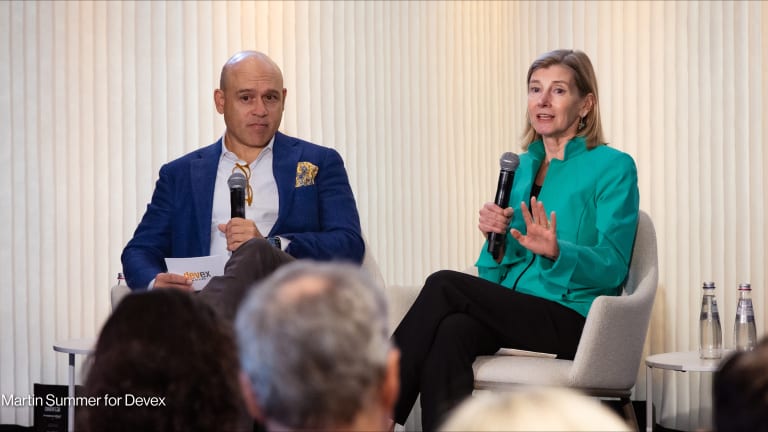
LONDON — A former NGO boss who now heads up a charitable foundation has made it his mission to convince philanthropists to give unrestricted funding.
One of the first things John Rendel did when he took over as head of grants at the Peter Cundill Foundation in 2019, was to “unrestrict” as many of the foundation’s grants as possible and get trustees to agree to only offer unrestricted funding going forward — unless commissioning for a specific service.
Having founded and run Promoting Equality in African Schools, or PEAS, a nonprofit network of secondary schools in Uganda and Zambia for 12 years before leaving to join the foundation, Rendel understands first-hand the benefits of unrestricted income — and the challenges of restricted funding — for charities.
“Restricted funding is distrustful … disrespectful … philanthropically self-defeating …[and] narcissistic,” Rendel wrote on Twitter earlier this year while announcing that PCF was “going unrestricted.”
“If we could nudge even 10% of our restricted funding into unrestricted, I would expect it to make a dramatic impact.”
— Tom Dannatt, founder and CEO, Street ChildRendel is not alone in this view — research shows that the average United Kingdom charity values unrestricted income twice as much as funding that comes with strings attached.
Tom Dannatt, founder and CEO of Street Child, an education NGO working in low-income and conflict-affected countries, said he would trade £1 ($1.30) of earmarked funding for between 25 to 50 pence of unrestricted money.
More on untying aid
► Donors agree to new rules on untied aid and eligibility
“Whilst we are always delighted to receive funds for agreed restricted ‘partnership’ projects … actually in most cases I would deploy these funds differently if I could and believe I would achieve an enhanced outcome by doing that,” Dannatt told Devex.
“If we could nudge even 10% of our restricted funding into unrestricted, I would expect it to make a dramatic impact,” he added.
Rendel has successfully changed the way that the Peter Cundill Foundation — which invests $9 million a year in education mainly in Canada, the U.K., and Africa — gives away its money, and is now turning his attention to converting others. And while some philanthropies already offer unrestricted grants — including the Mulago Foundation in the United States and the Esmée Fairbairn Foundation and Pears Foundation in the U.K. — they are still the minority.
Rendel also wants to encourage charities to push harder for unrestricted grants, noting that charities are often so grateful to get funding that they don’t argue for more flexible terms.
“If the arguments for unrestricted funding are widely known and charities get more confident about making them, then this could open the door at many foundations,” he said in an interview.
Street Child’s Dannatt agreed.
“I suspect we all need to be a little braver with our donors, and also put a bit more work into giving them the arguments and confidence they need to trust us with unrestricted [funding], and reap the benefits of the enhanced impact,” he said.
Trust is one of Rendel’s main arguments for why foundation’s should provide unrestricted funding.
“If you don’t trust the organization you’re funding, why trust a project they’re running? If you do trust them, then give them unrestricted funds,” he said.
Unrestricted funds can also foster better governance and accountability within a charity by allowing senior staff and trustees to focus on delivering their mission instead of trying to meet the competing demands of various donors, according to Rendel.
Also, by reducing the stress, time and costs a charity spends on reporting, accounting and fundraising, unrestricted funds also help a donor’s money and impact go further, Rendel said. Flexible funding also enables NGOs to be more entrepreneurial by giving them the autonomy to adjust their strategy, tactics, and inputs in order to be more effective, he added.
“It’s about total impact, not our impact as a funder. So who cares if our money ends up in a reserve or funding the CEO’s salary, as long as we feel the organization is working to prudently maximize the long-run impact of every dollar received,” Rendel wrote in a Twitter thread.
Moving to unrestricted funding also encourages foundations to think long-term about their giving, by moving them away from artificially “neat” bespoke projects, which tend to create waste, according to Rendel. In contrast, unrestricted funding helps organizations invest for the future.
Rendel is practicing what he preaches — the Peter Cundill Foundation now gives three-year grants that will extend by an additional year, every year, if the organization makes good progress against its own milestones.
However, going unrestricted be a challenge, especially when many trustees tend to prefer giving bespoke grants to smaller organizations, Rendel said.
“Foundations face a constant pressure to move back to restricted grants because it’s more tangible and appeals to a trustees’ emotional side. But you have to force yourself to be hard-headed,” he said.
But based on his own experience at the Peter Cundill Foundation, Rendel is optimistic attitudes can be changed.
“Since sharing the arguments for unrestricted grants, our board have become strong supporters of them. It made me realise that, for many trustees and philanthropists currently making restricted grants, the issue is simply a lack of awareness on the unintended effects of restricted grants,” he said.








